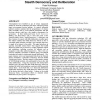Free Online Productivity Tools
i2Speak
i2Symbol
i2OCR
iTex2Img
iWeb2Print
iWeb2Shot
i2Type
iPdf2Split
iPdf2Merge
i2Bopomofo
i2Arabic
i2Style
i2Image
i2PDF
iLatex2Rtf
Sci2ools
100
click to vote
DGO
2006
2006
Should e-government design for citizen participation?: stealth democracy and deliberation
Cyberoptimists have heralded an age of citizen engagement enabled by electronic technologies that allow widespread citizen input in government decision making. In contrast, influential political scientists maintain that the preponderance of citizens quite reasonably wish to avoid political participation and that involving citizens could have very negative consequences for governance. In their widely-read book, Stealth Democracy, Hibbing and Theiss-Morse seek to show that much of the American public desires "stealth democracy"--a democracy run like a business by experts with little deliberation or public input. The authors maintain that stealth democracy beliefs are due to reasonable apathy rationales and that a more engaged democracy is simply of no interest to the public. This paper introduces an opposing "parochial citizens thesis" that suggests that stealth democracy beliefs may be driven by socially problematic beliefs and orientations, including reverence for ...
| Added | 30 Oct 2010 |
| Updated | 30 Oct 2010 |
| Type | Conference |
| Year | 2006 |
| Where | DGO |
| Authors | Peter Muhlberger |
Comments (0)

